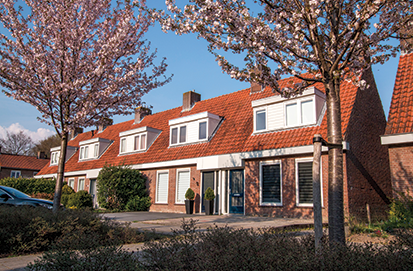The added value of housing cooperatives in the Dutch housing market
Housing cooperatives have so far had limited added value in solving major issues in the Dutch housing market. This is partly due to the large role that housing corporations play in the lower-income housing market. At the same time, the housing cooperative in the Netherlands can be a suitable vehicle to realise specific housing needs, such as housing like-minded groups of people. This is evident from our international comparative study on the position of housing cooperatives in Denmark, Germany, Austria, Sweden and Switzerland, which we conducted on behalf of the Ministry of the Interior and Kingdom Relations. The minister recently presented our research report to the House of Representatives.
Since the revised Housing Act came into force on 1 July 2015, tenants of housing associations have the option of starting a housing cooperative. A housing cooperative is defined in this Act as an association that aims to enable its members to independently provide for the management and maintenance of the housing units they occupy and the immediately adjacent environment. Evaluations of the revised Housing Act show that there has been very limited experience of setting up housing cooperatives since its introduction.
Parliamentary questions
As a result of these evaluations, Parliamentary questions were asked about the experience with housing cooperatives in the Netherlands, the associated bottlenecks and solutions, and the experience with housing cooperatives in other European countries. In response, the Minister of the Interior and Kingdom Relations (BZK) announced an international comparative study into the position of housing cooperatives in Denmark, Germany, Austria, Sweden and Switzerland. Ecorys conducted this research on behalf of the Ministry of the Interior and Kingdom Relations.
Added value remains limited
The added value of housing cooperatives on public housing tasks related to the availability of affordable housing is limited for the time being due to the small number in the Netherlands. In the Netherlands, contemporary housing corporations provide affordable housing stock for low and middle-income households. For this reason, it is not expected that housing cooperatives will contribute to a large extent to the national tasks related to availability and affordability in the (short) term.
The added value of housing cooperatives on the Dutch housing market appears to lie mainly in the realisation of specific housing needs for target groups that cannot meet them on the housing market. This may involve the affordability of housing, or specific features such as commonality, sustainability or accessibility.
Available and applicable instruments
The different countries included in this study use a variety of instruments to facilitate, encourage and/or promote housing cooperatives. The main instruments for the Dutch situation are financial in nature. Access to finance, for example, seems to be something that could still be promoted in the Netherlands.
Want to read more about this research? Then read the full research report in Dutch (pdf).
If you have any questions, please contact Erik van Ossenbruggen.

2 July 2021
2 minute read
Key Experts
Erik van Ossenbruggen
Consultant



